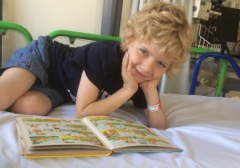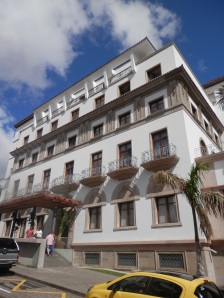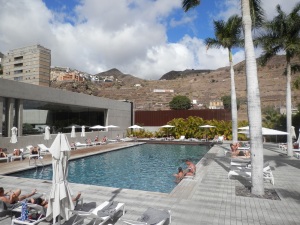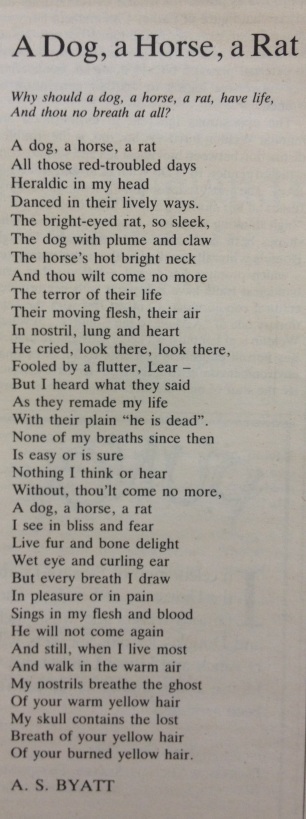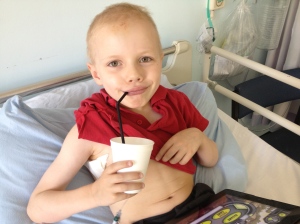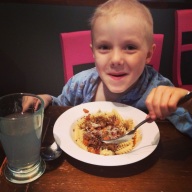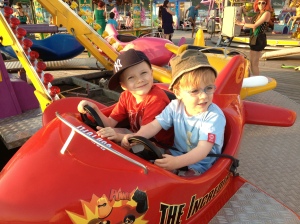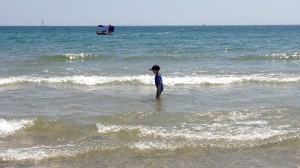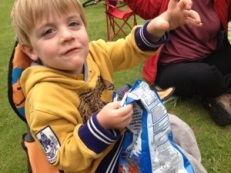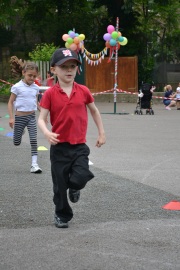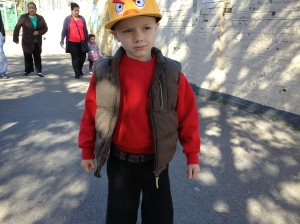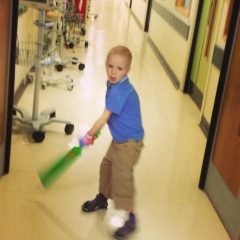
Safari ward corridor cricket
Hello Team Henry. Sorry for the long silences and then a barrage. As you may know if you read JD’s posts, we’re right in the eye of the storm again, and it sort of makes you want to ‘write the f*** out of’ it, to paraphrase the great Caitlin Moran.
Hen’s being fab. His wee is bright red, his hair’s about to fall out again, his face is starting to swell because of the steroids, and he’s a complete hoot about it all. As anyone who read my overly-emotional Facebook update this morning will know, I’m knocked over by him, humbled and proud.
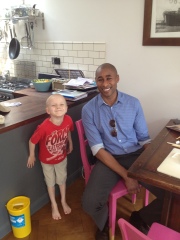
I forgot to mention Henry’s new handsome hospital tutor
And I’ve got a raging hangover – we have a few friends who have an uncanny knack of knowing exactly when we need to blow the cobwebs away with booze and good company, and we saw some of them last night. Hangovers make me verbose (more so than usual) and emotional, so be warned.
There are a few things I want to write about today, but they all come roughly from an empathy/admiration sort of place.
So firstly, we’ve felt very vulnerable a few times this year. I’d forgotten what it’s like to feel very vulnerable. To be honest, I think most middle-class urban dwellers rarely have occasion to feel vulnerable, and I’ve had almost two decades of urban middle-class dwelling. Apart from the nightmare we had when Huck arrived 13 weeks early, we’ve mostly lived in the bubble.
Hen’s in a clinical trial, and a few weeks ago we learned he’s been randomized to the treatment arm that’s untested. This made us think hard – can it possibly be right to put your beloved child through an untested treatment regime when they’re battling a frightful disease that may kill them? Can it possibly be right to pull out of the trial when you get into the slightly riskier group? If everyone did this there would be no medical trials, there would be no progress, and leukaemia, along with all other cancers, would claim the lives of all its victims.
That’s a real bugger of a decision to make, and we felt vulnerable. The only way we could deal with the situation was to do what all vulnerable people have to do – put your faith in the people and the institutions that are there to help you, and hope. So we’re still in the trial.
Oddly enough, it’s focused my mind on the benefits cap. The one that means quite a few vulnerable people in our neighbourhood and beyond will have to leave their homes and communities to live somewhere more cheaply. I learned a lot in the few years in the 90’s when I worked on what was then termed ‘Britain’s worst housing estate’, and I have been following the benefits cap with interest. I can see the sense in trying to lower the cost to the taxpayer given the sort of rents private landlords are charging to house people on benefits in London. There are plenty of better places the money could end up than in their pockets. It’s very hard to know what policy levers to pull to solve historic, chewy problems like this. But it’s fairly clear to most people that this is the wrong one. There must be a less appalling solution.
What amazes me is that, until our recent stint of vulnerability, I was only mildly cross about it. Now I’m bloody furious.
Like many people I was pretty far to the left in my youth but gave up socialism when I started to live and work and get a better appreciation of how complicated life is and how little room there is for any dogma. But the lack of vulnerability we’ve ‘suffered’ from over the last couple of decades seems to have taken the edge off my ability to empathise effectively with people whose lives are very, very different from mine, and that’s not a good way to be. So while of course I’d much rather Henry was nowhere involved in the hard life-lessons JD and I are again being taught as parents, at the very least, we’re learning stuff and re-learning stuff we’d forgotten.
Next up is sort of about empathy, but mostly admiration.
When you’re a little girl you need to watch the bigger girls to learn how to behave. It’s one of the great joys of life. I’d never have thought that when I got to 40 and was someone’s Mum I’d still need to look at the bigger girls to know how to behave, but I damn’ well do. I think a lot these days about two people – a good friend who was a most excellent boss to me when I was 23 (back on Britain’s worst housing estate, in fact). I’ve spent the following 17 years of my career trying to be like her at work, but she’s also the big girl I often think of when I’m trying to handle what life’s throwing at me at home at the moment. Her name is Katie. She’s amazing, and you can read some of her wisdom here (this is an article about the loss of her baby son James). She’s had to face some dreadful life experiences. And she has kept on living, kept on contributing everything she has, has kept her sense of humour and is bringing up two amazing kids who have been very kind to Henry.
The other person is my Aunty. She’s well into her eighties now. She also lost her son, when he was 9 years old. He died a few days before she gave birth to her fifth child. She kept on, she never forgot him, and she was and is a great mother to her other four kids.
I suppose they’re on my mind a lot because the horror of losing your child is something that’s very difficult to grasp and I can’t imagine what it’s like. But I’ve tried a few times over the last few months and it makes me think of Katie and Aunty K with increasing amazement and wonder. They are fantastic big girls to have in your life, and I owe them both a debt of thanks for many reasons. Not least as they have given me some vital clues about how to live when you’re struggling to keep the show on the road.
Anyway, I think I should stop there. It’s a lazy Saturday. And I just overheard this, so I’m off to join in the conversation:
Henry: “Dad, you know what people say is the most powerfulest thing in the world?”
JD: “Love?”
Henry: “No! The tip of a pencil!”
JD: “Henry, that’s great.”
Henry: “But Dad, they’re wrong. It’s my medicine that’s the most powerfulest thing in the world.”
